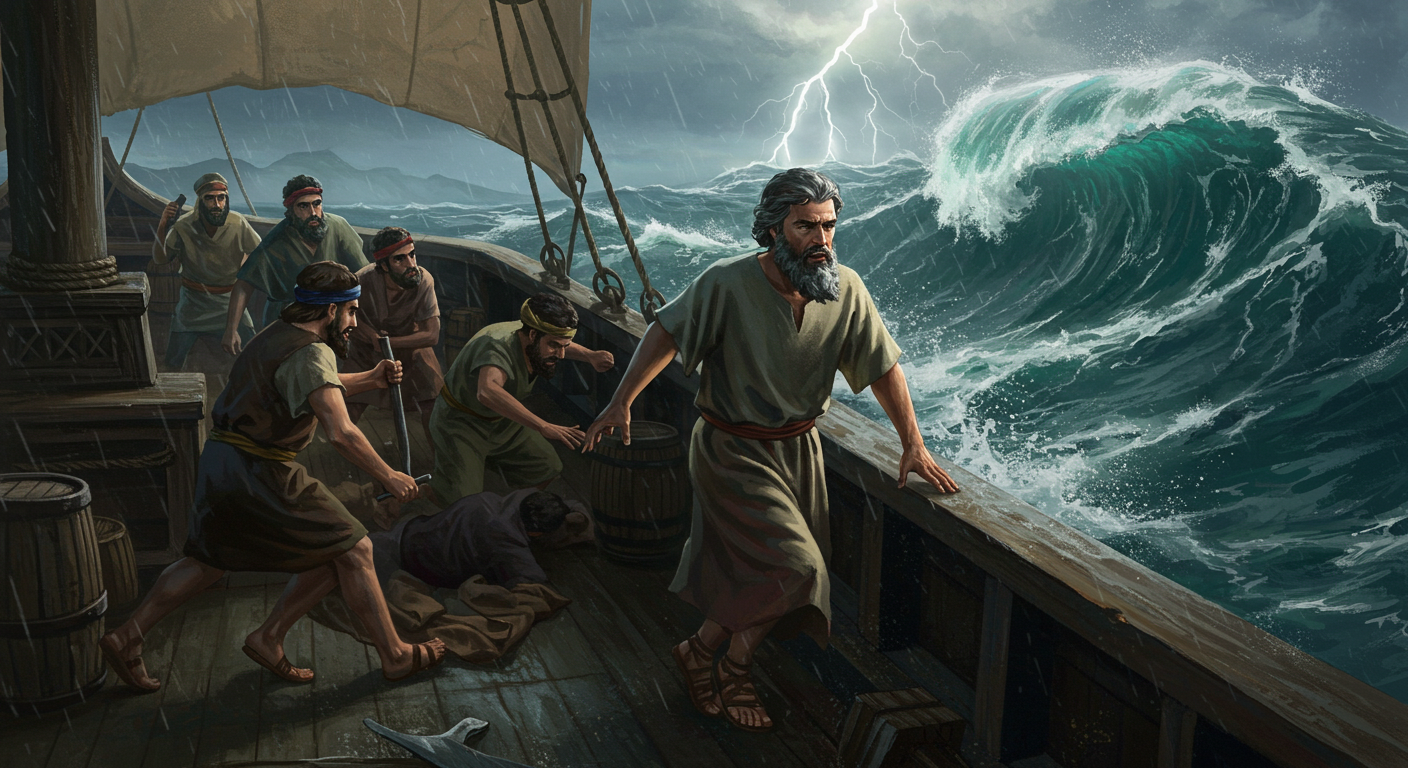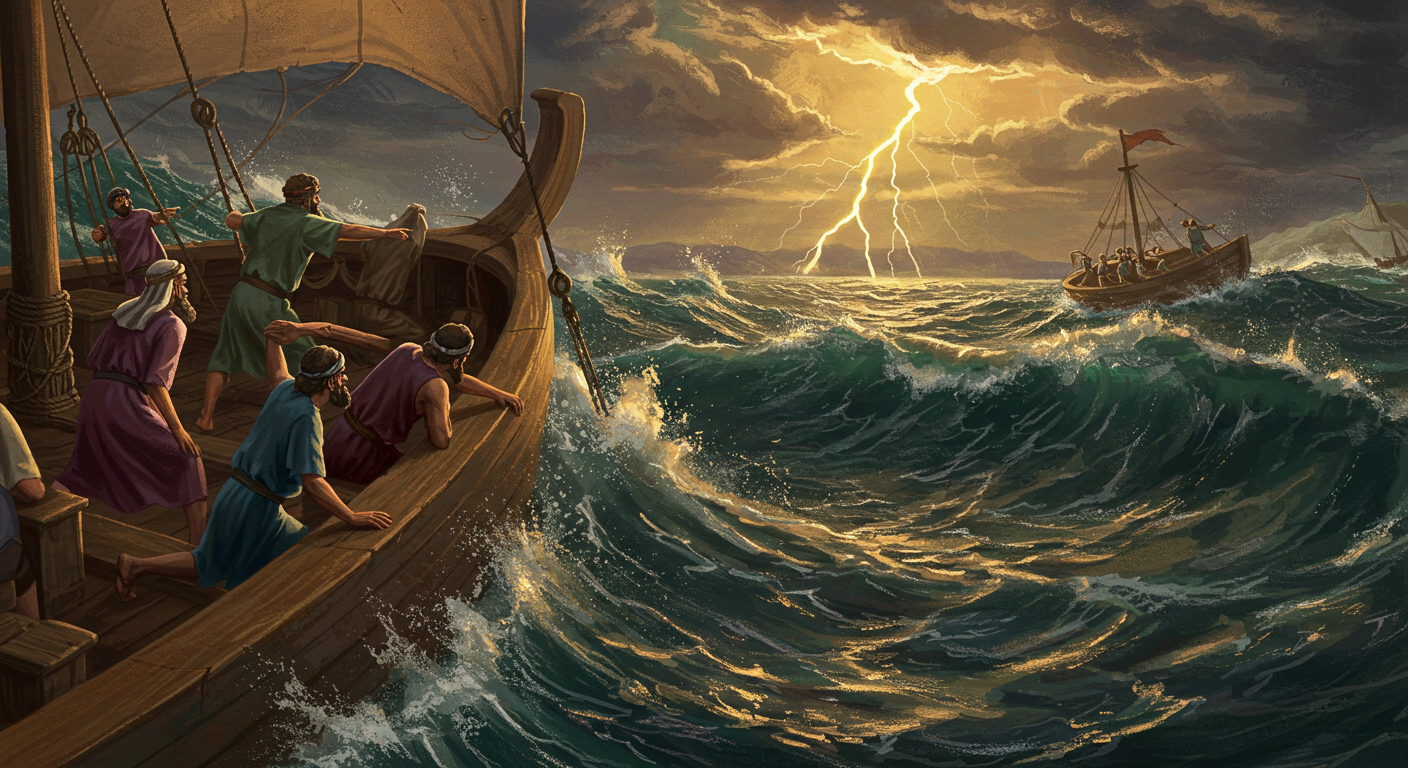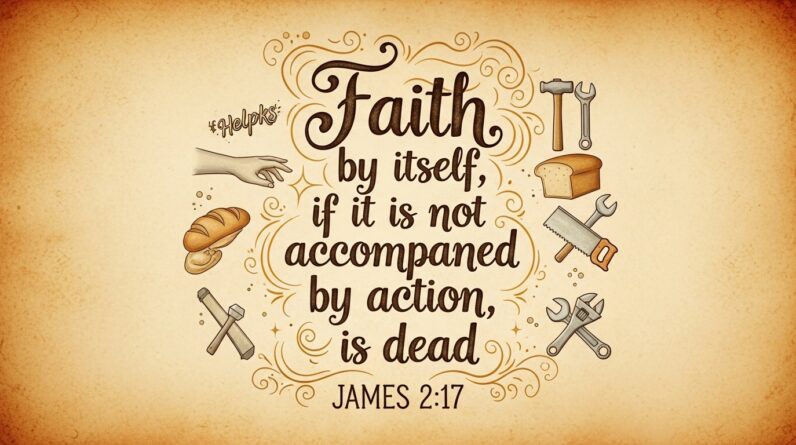Explore the compelling tale of Jonah, a reluctant prophet, wrestling with God’s call and mercy toward Nineveh. Dive into themes of rebellion, compassion, and redemption.
Jonah And Nineveh – Running From God’s Calling (Jonah 1-4)
Scripture Passage
Jonah 1:1-4:11 – link to the full chapter on Bible Gateway.

Introduction
Imagine yourself having a peaceful afternoon, and suddenly, a pressing call arrives—a call so daunting that your immediate response is to escape. This is the very essence of Jonah’s narrative, a story not just about disobedience but about the very real human struggle with embracing divine purpose. Today, we dive into the fascinating book of Jonah, a tale brimming with compassion, rebellion, and, ultimately, redemption. Our journey with Jonah is less about a colossal fish and more about a man wrestling with God’s desire for grace to reach even those he deems unworthy. As you engage with this sermon, allow your heart to reflect on your journey towards or away from God’s call.
Point 1: The Reluctant Prophet
Key Scripture: Jonah 1:1-3
Explanation: The opening verses of Jonah present God’s command for Jonah to go to Nineveh, a great city filled with wickedness. Yet, instead of following God’s directive, Jonah opts to escape, boarding a ship bound for Tarshish, the complete opposite direction. Nineveh’s reputation for brutality might have made Jonah’s hesitance understandable, but the bigger issue was his reluctance to see God’s mercy extended to his enemies.
Illustration: Picture yourself being asked to deliver a message of hope to someone who has wronged you deeply. It feels almost unjust, doesn’t it? That’s where Jonah stood—caught between his sense of justice and God’s overarching compassion.
Application: In our own lives, we may find ourselves like Jonah, running from tasks or people we feel unequipped or unwilling to face. The story challenges us to examine how we react to God’s direction, particularly when it conflicts with our desires or comforts. Consider how often fear, prejudice, or past hurts have kept you from stepping into your calling.
Point 2: The Storm of Consequences
Key Scripture: Jonah 1:4-16
Explanation: As Jonah attempts to flee from God’s presence, a massive storm engulfs his ship. Panicked sailors throw cargo overboard to lighten the ship, while Jonah sleeps below deck. It’s only when they cast lots and confront Jonah that they learn of his flight from the Lord, prompting his eventual confession. Jonah understands that he is the cause of their predicament and offers himself to be thrown into the sea.
Illustration: Imagine ignoring the warning signs on a road trip, determined to take a detour that only leads to chaos. Jonah’s storm emphasizes how our decisions, while personal, often ripple out, affecting those around us.
Application: Consider the storms in your life triggered by fleeing from responsibilities or callings. How many ‘sailors’—friends, family, or colleagues—have been caught in the tempest of your choices? This narrative encourages us to face the tumult and navigate back to the path we were meant to take.
Point 3: Redemption in the Deep
Key Scripture: Jonah 1:17-2:10
Explanation: Swallowed by a great fish, Jonah spends three days and nights in its belly. During this time, Jonah’s prayer of thanksgiving arises not from a place of escape but acknowledgment—an acknowledgment of God’s power and his situation. Despite the darkness, there is a clarity that comes with such divine detention, leading to Jonah’s eventual release onto dry land.
Illustration: Reflect on moments where you felt engulfed by circumstances, only to find clarity within the struggle. Much like Jonah in the fish, sometimes being in the ‘belly of adversity’ shifts our perspective, urging a realignment with divine purposes.
Application: This segment of Jonah serves as a reminder of redemption’s presence, even in despair. It’s a powerful call to recognize those moments when our circumstances become a catalyst for newfound commitments to our purpose. Are there areas in your life where you’ve seen this transformation?
Point 4: Obedience and Proclamation
Key Scripture: Jonah 3:1-4
Explanation: After his time in the depths, Jonah is once again directed to Nineveh. This time, Jonah obeys, delivering God’s message of impending destruction within forty days. Surprisingly, Nineveh believes the message, initiating a citywide fast and repentance, from king to commoner, turning away from their evil ways.
Illustration: Think of a time when you reluctantly followed through on a difficult task only to witness unexpected receptivity and change. Jonah might have anticipated resistance, yet the city transformed upon hearing his message, highlighting the power of obedience.
Application: The story of Nineveh urges us to deliver truth even amidst doubt. God’s instructions often lead us to places where our voices encourage profound change and transformation. Do you have a message you’re withholding, fearing its acknowledgment?
Point 5: The Compassion of God
Key Scripture: Jonah 3:10-4:11
Explanation: However, instead of rejoicing at Nineveh’s repentance, Jonah reacts with anger. He confesses to fleeing initially because he knew God’s merciful nature—fearing that compassion would be shown to his enemies. His frustration grows as he experiences discomfort, culminating in God’s lesson through the plant that withers, teaching Jonah about compassion over anger.
Illustration: Consider wanting someone to endure consequences you perceive as deserved, only to witness them receive grace instead. Jonah’s struggle mirrors our own battles with accepting divine mercy extended to those we’re at odds with.
Application: This passage invites us to inspect our hearts, questioning our responses to God’s fairness and love towards others. It’s a challenge to extend grace beyond our biases, aligning our compassion with God’s. Reflect on how you might be called to shift your stance towards adversaries in your life.

Conclusion
In the narrative of Jonah, we find our tendencies mirrored: running from divine direction, begrudgingly stepping towards undesired tasks, and wrestling with God’s boundless mercy. Jonah’s story serves as a reflective mirror, urging us to reconcile our will with God’s greater plans. Whether caught in the belly of indecision, tossed by storms of consequences, or standing in the shadow of anger, remember that God’s compassionate reach is always greater.
As you walk away from this exploration of Jonah, let it encourage you to embrace God’s call, leaning into mercy, not just for those you love, but also for those you struggle to extend it to. Be challenged to reexamine how you can transform rebellion into trust and displacement into rootedness in God’s purpose.







